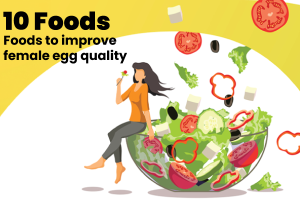Lifestyle and infertility

Our fast-paced lives have brought a lot of changes in the food we eat, the habits we develop, the way we sleep, and the way we work. The cravings for Pizzas, energy drinks, cakes, fried foods, night shifts, excessive use of cosmetics, late-night parties, a sedentary lifestyle, and sleepless nights have become part and parcel of Gen Z’s lives. But these normal everyday activities can take a big toll on both male and female fertility. This could be shocking but it’s a proven fact.
How does lifestyle impact fertility?
The main lifestyle factors that can affect fertility are:
· Advanced Age
· Consumption of Junk Foods
· Being Underweight or Overweight
· Sleep (too less or too much)
· Caffeine
· Smoking
· Alcohol Consumption
· Stress
· Occupational Exposure
· Illicit Drugs
· Prescription Drugs
1. Advanced Age
Age plays a crucial role in one’s fertility. Due to educational aspirations and career dreams, many couples postpone parenthood but many are not aware that fertility potential reaches a peak up to a certain age and then starts declining. Sperm count, motility & semen volume decrease in men after 35 years of age; morphology may become increasingly abnormal and after 40, the degree of DNA damage in sperm increases considerably.
In the case of women, the tendency to conceive decreases after 30. Women’s eggs develop chromosomal abnormalities with age and may lead to spontaneous miscarriages, other pregnancy-related complications, and genetic disorders in the child. When under the age of 30, a woman’s chance of conceiving may be as high as 71%, over 36 yrs of age, it may be 41%. If a couple wishes to postpone childbearing, they can take up fertility preservation methods to store their eggs or sperm, or embryos that can enable them to preserve their fertility and conceive in the future.
2. Consumption of Junk Foods
Studies have found that the consumption of junk foods can increase the time to pregnancy. In the case of women, the fat diet in junk foods may alter the levels of reproductive hormones and disrupt the menstrual cycle. According to research, a diet that’s rich in whole grains, fish and vegetables improves fertility.
3. Being Underweight or Overweight
BMI < 18.5 – underweight
BMI > 25 – overweight
BMI > 30 – Obese
Being underweight leads to ovarian dysfunction & infertility; these women tend to have a higher risk of pre-term birth. In the case of men, being underweight can cause lower sperm concentration.
Obese women face irregularities in their menstrual cycle and are prone to infertility, miscarriage, and stillbirth. Obese men are 3 times more likely to exhibit a reduction in semen quantity than men of normal weight. Obesity can also cause erectile dysfunction. Studies suggest that obesity also reduces the outcome of IVF treatment as well. Maintaining a healthy weight is essential to have improved chances of conception.
4. Sleep
Too much or too less sleep affects fertility in both men and women. Sleep deprivation can result in hormonal imbalances leading to infertility. 7-8 hours of sleep every day is necessary for improved fertility outcomes.
5. Caffeine
Excess caffeine has been associated with negative effects on female fertility (miscarriage, fetal death, stillbirth). Women who consumed more than 100 mg caffeine/day were more likely to experience a miscarriage.
6. Smoking
Cigarette smoke contains over 4000 chemicals. Smoking affects sperm count, morphology and also has a negative impact on sperm DNA. Studies suggest women who smoke have reduced ovarian reserve, altered uterine and tubal functioning as well as disruption in hormone levels.
7. Alcohol Consumption
Alcohol can lead to testicular atrophy, reduced sperm count, and decreased libido in men. Women who drink have lower conception rates and higher chances of spontaneous abortion and fetal death. Studies have shown women who have experienced hangovers were more likely to be infertile than women who did not experience hangovers, suggesting that the amount of alcohol consumed does matter.
8. Stress
Stress is a prominent part of any society, whether it is physical, social, or psychological. Infertility is itself stressful due to societal pressures, testing, diagnosis, treatments, failures, unfulfilled desires, and even fiscal costs with which it is associated.
Stress and depression are thought to reduce testosterone, disrupt gonadal function and ultimately reduce sperm parameters. Women who worked for >32 hrs/week experienced a longer time to conception.
9. Occupational Exposure
i. Air Pollutants
Air pollutants like carbon monoxide, industrial emissions, and sulfur dioxides can affect men’s fertility and also cause pre-term delivery, stillbirth, and fetal loss.
ii. Heavy metals
· Lead found in paints, ceramics, etc. can affect the menstrual cycle and can lead to miscarriage, abortion, etc.
· Mercury found in industrial emissions, thermometers, etc. can affect sperm
iii. Lubricants
All lubricants like KY jelly cause sperm damage.
iv. Endocrine-disrupting chemicals (EDC)
EDC are chemicals that mimic natural hormones and cause a negative effect on the functioning of hormones in the body. EDCs are found in household items like food storage plastics, children’s toys, soaps, lubricating oils, shampoos, etc.
v. Radiation
Studies suggest that gamma and x-rays also can have a devastating effect on fertility. Cell phones have a negative effect on male fertility. Studies have shown that men who carry cell phones across their waist have decreased sperm count compared to others who carried their phones elsewhere.
vi. Clothing and Hot baths
Tight-fitting clothes may increase the scrotal temperature thereby affecting semen quality. Hot baths are known to affect sperm production.
10. Illicit Drugs
Drugs like Marijuana, Cocaine, etc. can decrease sperm production, sperm motility and can lead to decreased sexual stimulation, erectile dysfunction, etc.
11. Prescription drugs
Irreversible effect on reproductive function is seen with colchicine, cyclophosphamide, antipsychotics, H2 blockers that can cause a rise in prolactin and also cause sexual dysfunction. It is necessary to check which drugs cause fertility issues and then determine if these effects are permanent.
Tips for a healthy diet:
Consuming a diet rich in carbohydrates, fibre, folate, lycopene as well as fruit and vegetables correlates with improved semen quantity. Consuming a lower amount of protein and fat is more beneficial for fertility in both men and women.
What is a fertility diet?
A fertility diet should include a higher monounsaturated to trans fats ratio, veg over animal protein, high fat over low-fat dairy, a decreased glycemic load, and an increased intake of iron and multivitamins.
Studies have shown lower rates of infertility in couples with this fertility diet.
Role of antioxidants
Antioxidants help to remove excess ROS (reactive oxygen species) in seminal ejaculate and assist in the conversion of ROS to compounds that are less detrimental to cells in males. Females who take multivitamins may be less likely to experience ovulatory infertility. Antioxidants include Vitamin C, E, albumin, ceruloplasmin, ferritin, etc.
Dirty Dozen: (foods containing most pesticides): Apples, Celery, Strawberries, Peaches, Spinach, Imported Grapes & Nectarines, Sweet bell pepper, Potatoes, Blueberries, Lettuce, and Collard greens.
Clean Fifteen: (foods containing least pesticides): Onion, Sweet corn, Pineapples, Avocado, Asparagus, Sweet peas, Mangoes, Eggplant, Cantaloupe, Kiwi, Cabbage, Watermelon, Mushrooms, Domestic sweet potato, Grapefruit.
Safety tips for eating fish & shellfish
1. Do not eat Shark, Swordfish, and King mackerel because of high mercury levels.
2. Eat fish low in mercury such as Shrimp, Canned light tuna, Salmon, Pollock, and catfish. White tuna has more mercury than canned light tuna.
Simple habits to limit toxicity
1. Read Labels: If you cannot pronounce it, do not buy it.
2. Go Organic: Although it costs more, so does eating pesticides and other harmful substances. The lesser the distance one’s food travels, the lesser the exposure to chemicals, it likely has.
3. Avoid chemicals: Cosmetics and water are common harbingers of toxins but so are canned goods, scented perfumes, air fresheners, and household cleaners. You can create your own cleaners with lemon juice & vinegar and use essential oils as air fresheners.
4. Drink filtered water: Use bottles that do not have BPA (Bisphenol A). Metal containers and glass bottles are far safer than plastic ones.
5. Do not microwave in plastics or unmarked containers: Use plastics that are labeled as “microwave safe”.
Exercise
A healthy amount of exercise in men and women can be beneficial. Physical activity for at least 3 hrs/week is recommended.
Lifestyle modifications can go a long way in boosting men’s and women’s fertility. If you are planning to conceive, avoid junk foods, smoking, and alcohol, maintain a healthy weight, and have a balanced diet. Happy Parenthood!










